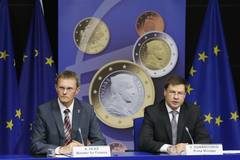
On 1 January 2014, Latvia became the 18th member of the Eurozone and the second Baltic state to adopt the currency following Estonia in 2011. The Latvian adoption of the euro happened under widespread public fear over possible price rises and the future of the single currency.
Latvians’ reluctance can be seen in light of the country’s closer integration within the European Union and its physical proximity to Russia, since the adoption of the euro also entails the loss of a currency that was a cherished symbol of sovereignty. Fears of an increase in prices is again one of the major concerns shared by the public at large, similar to widely reported concerns that existed in other Eurozone countries such as France.
The euro can however be seen as a means to maneuver itself out of Russia’s long shadow as this historic threat remains one of the most important factors in Latvian politics. This rapprochement to the western economy is aimed to discourage Moscow’s meddling and to reduce Latvia’s dependency on Russia. The Latvian population's apprehension at joining the euro led to calls for the country to hold a referendum on membership. But efforts to force a referendum failed to gain enough support in Parliament – needing one third of all MPs – or enough signatures from the public.
Five years ago, Latvia’s economy came crashing down, after which it endured stringent EU austerity measures that helped stabilize its economy and allowed it to join the Eurozone. Nevertheless, the country still faces high poverty levels, unemployment and emigration. As one of the good pupils in the European classroom, Latvia’s recovery triggered the discussion over the pros and cons of rigid austerity and fixed-exchange rates. European officials sought to make clear that hard grind pays off better than a quick fix devaluation. Olli Rehn, the EU Commissioner for Economic and Monetary Affairs, even said Latvia was a role model for EMU crisis states. However, the critics believe that it was the euro-peg that led Latvia to the financial disaster in the first place. Real GDP remains 8pc below its peak even now and the unemployment rate has been flattened by emigration. The same critics question which lessons Latvia holds for other countries and the euro in general since the Latvian society has been gutted.
Since its Eurozone membership inspired much concern and opposition, the key question is "whether Latvia is close to fulfilling its potential as a post-Marxist Tiger economy with full access to EU markets that should be enjoying Asian style growth rates".
Read The Telegraph article here.
